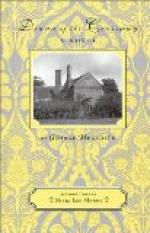They beheld a quaint spectacle: a gentleman, obviously an Englishman, approached, with the evident intention of reminding the Beauty of the night of her engagement to him, and claiming her, as it were, in the lion’s jaws. He advanced a foot, withdrew it, advanced, withdrew; eager for his prize, not over-enterprising; in awe of the illustrious General she entertained—presumeably quite unaware of the pretender’s presence; whereupon a voice was heard: ’Oh! if it was minuetting you meant before the lady, I’d never have disputed your right to perform, sir.’ For it seemed that there were two claimants in the field, an Irishman and an Englishman; and the former, having a livelier sense of the situation, hung aloof in waiting for her eye; the latter directed himself to strike bluntly at his prey; and he continued minuetting, now rapidly blinking, flushed, angry, conscious of awkwardness and a tangle, incapable of extrication. He began to blink horribly under the raillery of his rival. The General observed him, but as an object remote and minute, a fly or gnat. The face of the brilliant Diana was entirely devoted to him she amused.
Lady Dunstane had the faint lines of a decorous laugh on her lips, as she said: ’How odd it is that our men show to such disadvantage in a Ball-room. I have seen them in danger, and there they shine first of any, and one is proud of them. They should always be facing the elements or in action.’ She glanced at the minuet, which had become a petrified figure, still palpitating, bent forward, an interrogative reminder.
Mr. Redworth reserved his assent to the proclamation of any English disadvantage. A whiff of Celtic hostility in the atmosphere put him on his mettle. ‘Wherever the man is tried,’ he said.
‘My lady!’ the Irish gentleman bowed to Lady Dunstane. ’I had the honour . . . Sullivan Smith . . . at the castle . . .’
She responded to the salute, and Mr. Sullivan Smith proceeded to tell her, half in speech, half in dots most luminous, of a civil contention between the English gentleman and himself, as to the possession of the loveliest of partners for this particular ensuing dance, and that they had simultaneously made a rush from the Lower Courts, namely, their cards, to the Upper, being the lady; and Mr. Sullivan Smith partly founded his preferable claim on her Irish descent, and on his acquaintance with her eminent defunct father—one of the ever-radiating stars of his quenchless country.
Lady Dunstane sympathized with him for his not intruding his claim when the young lady stood pre-engaged, as well as in humorous appreciation of his imaginative logic.
‘There will be dancing enough after supper,’ she said.
’If I could score one dance with her, I’d go home supperless and feasted,’ said he. ’And that’s not saying much among the hordes of hungry troopers tip-toe for the signal to the buffet. See, my lady, the gentleman, as we call him; there he is working his gamut perpetually up to da capo. Oh! but it’s a sheep trying to be wolf; he ’s sheep-eyed and he ’s wolf-fanged, pathetic and larcenous! Oh, now! who’d believe it!— the man has dared . . . I’d as soon think of committing sacrilege in a cathedral!’




